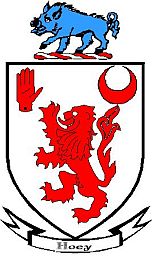
Ulaid or Ulaidh was a Gaelic over-kingdom in north-eastern Ireland during the Middle Ages made up of a confederation of dynastic groups. Alternative names include Ulidia, which is the Latin form of Ulaid, and in Cóiced, Irish for 'the Fifth'. The king of Ulaid was called the rí Ulad or rí in Chóicid.
The following lists events that happened during 1835 in Australia.

Dál nAraidi or Dál Araide, sometimes latinised as Dalaradia or anglicised as Dalaray, was a Cruthin kingdom, or possibly a confederation of Cruthin tribes, in north-eastern Ireland during the Middle Ages. It was part of the over-kingdom of Ulaid, and its kings often contended with the Dál Fiatach for the over-kingship of the province. At its greatest extent, the borders of Dál nAraidi roughly matched those of County Antrim, and they seemed to occupy the same area as the earlier Robogdii of Ptolemy's Geography, a region shared with Dál Riata. Their capital was Ráth Mór outside Antrim, and their eponymous ancestor is claimed as being Fiachu Araide.

Dál Fiatach was a Gaelic dynastic-grouping and the name of their territory in the north-east of Ireland, which lasted throughout the Middle Ages until their demise in the 13th century at the hands of Normans. It was part of the over-kingdom of Ulaid, and they were its main ruling dynasty for most of Ulaid's history. Their territory lay in eastern County Down. Their capital was Dún Lethglaise (Downpatrick) and from the 9th century their main religious site was Bangor Abbey.

Sir Samuel McCaughey was an Irish-born pastoralist, politician and philanthropist in Australia.

Doolan is a surname of Irish origin. They were chiefs of the Clan Breasail Mac Duileachain in the Ulaid sub-kingdom of Dál Fiatach, specifically located in what became the barony of Castlereagh.

Haughey is an Irish surname of noble origins. Spelling variations include: Hoey, McCaughey and McKeogh, among others.
McNulty is an Irish surname. It is derived from the Gaelic Mac an Ultaigh meaning "son of the Ulsterman". Usually considered a branch of the Ulaid ruling dynasty of Mac Duinnshléibhe (MacDonlevy), a branch of Dál Fiatach, who fled Ulaid to Ailech after the former's conquest in 1177 by the Normans. DNA analysis points to descent from other Ulaid families as well. After the Battle of Kinsale in 1602, some McDonlevys and McNultys migrated to the province of Connacht where their name is now also common.

McGowan is an Irish and Scottish surname. It is an Anglicization of the Irish Mac Gabhann and Scottish Mac Gobhann, both of which mean 'son of (the) smith'. Belonging to the Uí Echach Cobo, located in modern-day western County Down, Ulster, they were of the same stock as the McGuinness clan.

Aodh is a masculine Irish and Scottish Gaelic given name, which was traditionally anglicized as Hugh. The name means "fire" and was the name of a god in Irish mythology.
Donlevy is an Irish surname derived from the Gaelic Mac Duinnshléibhe/Ó Duinnshléibhe 'son/descendant of Donn Sléibhe'; a given name meaning 'Donn of the mountain', i.e. 'dark mountain'. The MacDonlevys were the hereditary rulers of Dál Fiatach and styled as the Kings of Ulaid, i.e. rulers of (east) Ulster, in present-day County Down.
The Darini (Δαρῖνοι) were a people of ancient Ireland mentioned in Ptolemy's 2nd century Geography as living in south Antrim and north Down. Their name implies descent from an ancestor called Dáire (*Dārios), as claimed by several historical peoples, including the Dál Riata and Dál Fiatach (Ulaidh) in the same area of eastern Ulster as well the Érainn (Iverni) of Munster. An early name for Dundrum, County Down, is recorded as Dún Droma Dáirine, and the name Dáirine was applied to the Érainn dynasty.

Hoey is an Irish surname. Spelling variations include: O'Hoey, Haughey, McCaughey, Hoy and McKeogh, among others. The original Irish spelling is Ó hEochaidh.

McKeogh is an Irish surname. Spelling variations include: MacKeogh, McKeough, Keogh Kehoe, McCaughey and Hoey, among others. Modern spelling comes from the original Mac Eochaidh.
Drennan is a surname of Irish origin. Variations of the name are found primarily in Ireland, Scotland, and the United States. The surname is purportedly derived from the Gaelic Ó Droighneáin, Ó Draighnáin, or Ua Draighnen, meaning "descendant of Draighnen", or "descendant of blackthorn". Variant spellings include Drennen, Drenning, Drennon, Drinan, Drinnan, Drinnon, and Drynan. Thornton is another Anglicized surname from the same original Gaelic form.
Cowan is a surname of both Scottish-Irish and English origins.
McGough is an Irish surname that originated in Westmeath
McMenamin is an Irish surname. In Gaelic it is rendered, Mac Meanman, meaning 'son of Meanma' a name meaning courageous or high spirited. It originated in County Donegal in the 13th century. The first written mention of the name is in 1303 in the 'Annals of Loch Cé' which records the deaths of Donnchadh Mac Meanman and Aedh Mac Meanman, grandsons of the Lector O'Domnhaill, the chieftain of Fanad, during a dynastic struggle within the Cenél Conaill. The McMenamins are a branch of the O'Donnells of Tyrconnell (Donegal) and are part of the Sil Lugdach, descendants of Lugaid mac Sétnai, the great-grandson of Conall Gulban. Like many discarded branches of noble families, the McMenamins sought advancement in the church evidenced by numerous mentions of McMenamin prelates in papal letters from the late 1300s to the late 1400s. They were supplanted in their home territory of Fanad by the Sweeneys and over the centuries became more distantly related to the royal line of the Cenél Conaill. One scholar describes the family as "...a discarded branch of the O'Donnell dynasty"

McKinley, MacKinley or Mackinlay is a Scottish and Irish surname historically associated with northwestern Ireland's County Donegal, the over-kingdom of Ulaid in northeastern Ireland and the Scottish Highlands.








